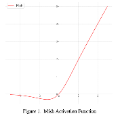Transformer structures have demonstrated outstanding skills in the deep learning space recently, significantly increasing the accuracy of models across a variety of domains. Researchers have started to question whether such a sophisticated network structure is actually necessary and whether equally outstanding results can be reached with reduced inference cost due to its complicated network topology and high inference cost. In order to prove the Mixer's efficacy on three datasets Speech Commands, UrbanSound8k, and CASIA Chinese Sentiment Corpus this paper applies amore condensed version of the Mixer to an audio classification task and conducts comparative experiments with the Transformer-based Audio Spectrogram Transformer (AST)model. In addition, this paper conducts comparative experiments on the application of several activation functions in Mixer, namely GeLU, Mish, Swish and Acon-C. Further-more, the use of various activation functions in Mixer, including GeLU, Mish, Swish, and Acon-C, is compared in this research through comparison experiments. Additionally, some AST model flaws are highlighted, and the model suggested in this study is improved as a result. In conclusion, a model called the Audio Spectrogram Mixer, which is the first model for audio classification with Mixer, is suggested in this study and the model's future directions for improvement are examined.
翻译:暂无翻译




